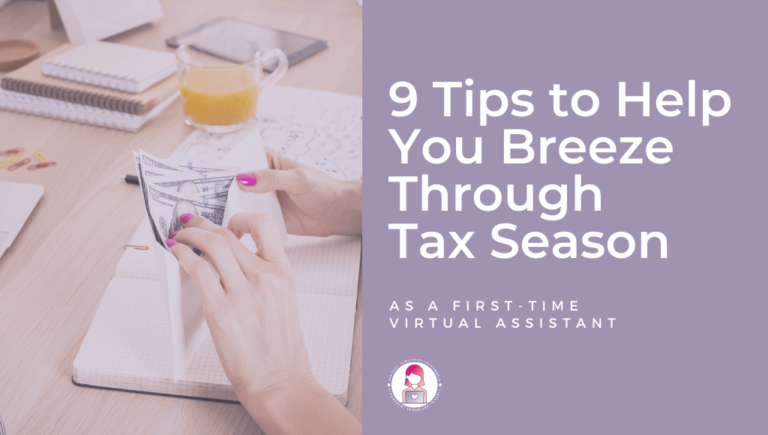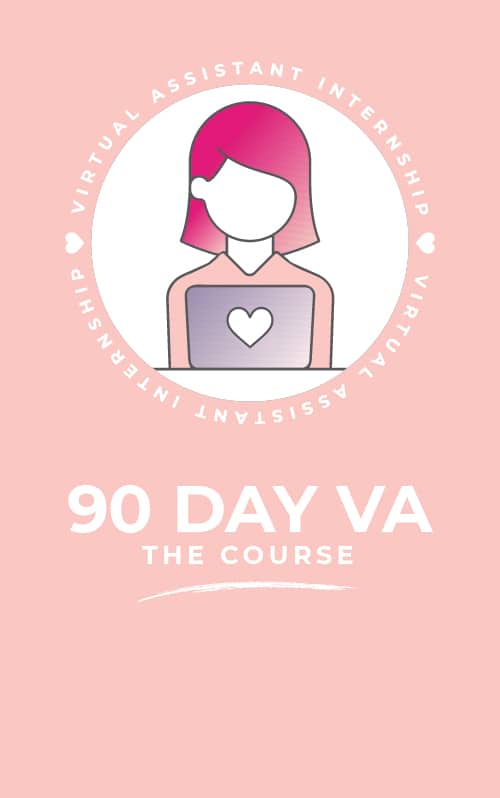Tax season is upon us and it can be super intimidating and a very overwhelming topic, especially if you’re first starting to work online as a virtual assistant, contractor, or you’re self-employed.
You think to yourself like, “I’m not working as an employee, so what do I do with my taxes?!”, or worry that the “IRS is going to come after me”.
Just know that you’re not alone. This is a very common situation to be in and can be stressful – I know it was for me!
Before you freak out, I sat down with my very own Chief Financial Officer, Morgan de Klerk to talk about how to get your finances in order, how to manage invoices, receipts, spreadsheets, and all the things that you need to breeze through tax season.
And the BEST part? You don’t need any accounting experience! So let’s dive in and make this your easiest tax process ever by answering some of your burning questions.
Why It’s Important to Have a Bookkeeping System
Morgan has traveled around the world all while working remotely. She has two degrees in Accounting and International Business and loves combining the two to help freelancers and contractors figure out their tax systems and bookkeeping.
As a remote entrepreneur herself, she understands that the tax process itself may be daunting but it doesn’t have to be. All that’s needed is a little guidance, and it can definitely be manageable.
So with that in mind, Morgan and I discuss some of the major topics for those who are new to preparing taxes as a first-time business owner or remote worker. We’ll cover these questions:
- What are the differences between a Bookkeeper, CPA, and Accountant?
- What is the most important thing to not miss when prepping for taxes?
- What to use to easily track expenses?
- What are the differences between filing as a contractor vs filing as an employee?
- Why is saving a percentage of your income every month important?
- What is one thing to start right now to help get your finances in order?
- Why is having an emergency fund essential?
- Do you have to be good at math to do your taxes?
- Why should you have the right money mindset?
Let’s look at these in more detail!

1. What Are the Differences Between a Bookkeeper, CPA, and Accountant?
What is a Bookkeeper?
First, let’s break down what a bookkeeper does. Morgan does the bookkeeping for Virtual Assistant Internship. She records my income and expenses, organizes them in the right places, pays my bills, sends out invoices and receipts to affiliate payments.
As a bookkeeper, she also sends out a monthly budget for tracking expenses, sets out my financial goals, and tracks the progress. Essentially, she’s the queen of helping me strategize where I want to take my business financially.
What is an Accountant?
An accountant is really where one has studied accounting at a university. Keep in mind though, different states in different countries have different laws where you cannot have an accountant in your business’s name unless you are a CPA – Certified Public Accountant.
What is a Certified Public Accountant (CPA)?
A CPA is someone that has gone through the accounting process and gotten certified for what they’re doing. They went through a CPA test and can put CPA at the end of their name, and can fulfill multiple roles, such as tax auditors. Examples are big accounting firms like Ernst and PriceWaterhouseCoopers.
In a nutshell, a bookkeeper has experience and training in doing people’s financial books, allocating income and expenses, invoicing, paying bills, etc, and then going to a CPA to get the finalized financial statements.
2. What Is the Most Important Thing to Not Miss When Prepping for Taxes?
Morgan says that many first-time freelancers do not keep track of their expenses and other finances regularly.
Even if you’re not making an income yet, which some VAs are just getting started, you STILL have tax-deductible expenses that you can take advantage of. Examples are business meals, home office expenses, and even your cell phone.
It’s important to track the money you bring into your business and the money that goes out. Unless you’re keeping track of all this, you’re not going to know at year-end, and that’s money you’re throwing away out of your pocket.
What’s also important to note is what counts as a deductible depending on what state and country you live in.
Say you just bought a course like 90 Day VA, or bought yourself a laptop, but don’t have a client yet, there are different thresholds and minimums that the state or country keeps track of. Do your research and ask your tax preparer if you need help.

3. What You Can Use to Easily Track Expenses
A misconception that a lot of people have is that tracking expenses can be hard. But guess what? IT’S NOT!
For years, when I first started my business, I used spreadsheets and filed my taxes using software like TurboTax. This is also one thing that people can start right now to get their finances in order. And it worked out great!
For the average person doing basics, this is the perfect system for you. Not only will this help you organize and track your expenses better, but you’ll be able to provide your tax preparer a list of the different expenses. And you don’t have to sign up for an accounting platform, you can just easily create a basic spreadsheet.
However, if you need help creating a spreadsheet, and you haven’t been tracking how much you’ve made or spent over the last year, Morgan created a program called Expedite Your Books, which shows you how you can do one year of bookkeeping in ONE HOUR.
So if you need to file your taxes, and haven’t thought about any of it for the past year, or haven’t done anything for 2020, this is the BEST place to start, as it’s going to take you through everything your tax practitioner needs.
4. What Are the Differences Between Filing as a Contractor vs. Filing as an Employee?
If you’re an employee at a company, they’re deducting taxes on your behalf, taking it off your payslip before that money hits your bank account. So you still need to file your taxes but a large portion of these taxes have already been paid on behalf of your employer, and behalf of you.
Working as a contractor, you’re getting your money as a whole and then you need to deduct your own taxes on top of that.
If you’re working as both a contractor and an employee, you’ll have to separate those on your tax return.
It’s best to ask a tax preparer to help you figure this out as it can be confusing.
5. Why Is Saving a Percentage of Your Income Every Month Important?
A healthy money habit is to make sure that you’re saving a percentage of your income every month.
Most first-time freelancers don’t even realize that they have to pay a self-employment tax, which is what you pay to the federal government to fund Medicare and Social Security. So it’s good to set aside money and be prepared to make quarterly payments or pay one lump sum at the end of the tax season.
Every month, transfer about 15% to 30% of your income. This may sound like a lot, and in the beginning, it SUCKS to transfer that money out of what you’re making but at the end of the year come tax time, you’ll be ready to pay that GIANT bill and you’re going to thank yourself.
Percentages can differ depending on where you live. So if you live in the US, there’s a federal tax and state tax that you should consider.
And if you’re a US citizen living abroad, you can get the foreign income tax exclusion, meaning you don’t have to pay a state tax.
Trust me, I know saving that much can be HARD! Open up a savings account, and if you know yourself and you’re not good at savings, open up a savings account at a different bank.

6. What Is One Thing to Start Right Now to Help Get Your Finances in Order?
If you’ve started a business and you don’t have a business account, add this on your list after you Google how much you need to be saving for taxes.
You can open different accounts online through your bank’s website, which can take a few minutes. What’s cool is that you can have several different ones – your personal one, a joint one with your spouse, or one that you have your family with.
Examples of business expenses are things that you use for your business – computer software, business meals, home office space, and even your cell phone.
Separating your business expenses from personal expenses NOW will help make the process of filing for taxes so much easier for you!
7. Why Is Having an Emergency Fund Essential?
Let’s explore further why having a savings account is essential. Not only will this increase your savings, but it will also cover expenses during a time of financial emergency.
One way you can do this is by “paying yourself” at the same time every month. Saving at least 3% of the money coming in, and placing it into another account creates sort of a buffer for you in case you find yourself in a financial bind.
Say you are suddenly dropped by a client, or you may not have consistent clients paying you every month, you can dip into your emergency fund to help offset expenses.
Morgan recommends having three to six months of income saved in your emergency fund, knowing that it can cover three to six months of your expenses.
8. Do You Have to Be Good at Math to Do Your Taxes?
A common misconception that people have when doing taxes, is that they have to be good at math – and I was one of those people.
That was one of the reasons why I hired Morgan because I was so freaked out about math.
Many people believe bookkeeping and accounting is math because it involves numbers and that’s not the case AT ALL. It’s just organization and moving numbers around.
You have to see it as that the numbers are already there and already happened. You’re just organizing it into your different accounts like, “Was it this client”, “Was this used for advertising?”, or “Was it for bank fees?”.
9. Why You Should Have the Right Money Mindset?
There’s a lot of research around why our brains work the way they do, and sometimes it’s the way we’re brought up.
How often was money spoken about in your house?
Was money tight when you were growing up?
Was money abundant when you were growing up?
Your answers to these questions affect the way we look at money, and how we treat our finances.
She thinks that the biggest thing to start is to change our money mindsets – and one of those ways is by having conversations with friends. It can be questions like, “How do you put money away?”, “Do you save for taxes?”, or “Are you investing?”.
Having money conversations with your friends can make you more comfortable about it. It acknowledges how you were brought up, and can pinpoint any money traumas that are stored in your brain.
If you aren’t able to become comfortable with money, and adjust your mindset, you can stop your overall growth financially and career-wise.

The process of filing your taxes as a first-time freelancer or virtual worker can be scary. But if you follow these 9 ESSENTIAL tips, you’ll be breezing through tax season in no time!
Need more tax help? You can learn more about Morgan and find her and Expedite Your Books here!
If this puts your mind at ease on how to prepare for taxes, but you’re not really sure what online career you want to jump into, sign up for my FREE Work From Anywhere Virtual Summit, where 15 Experts have come together to help YOU launch the career of your dreams!
So what are you waiting for? Start today!




